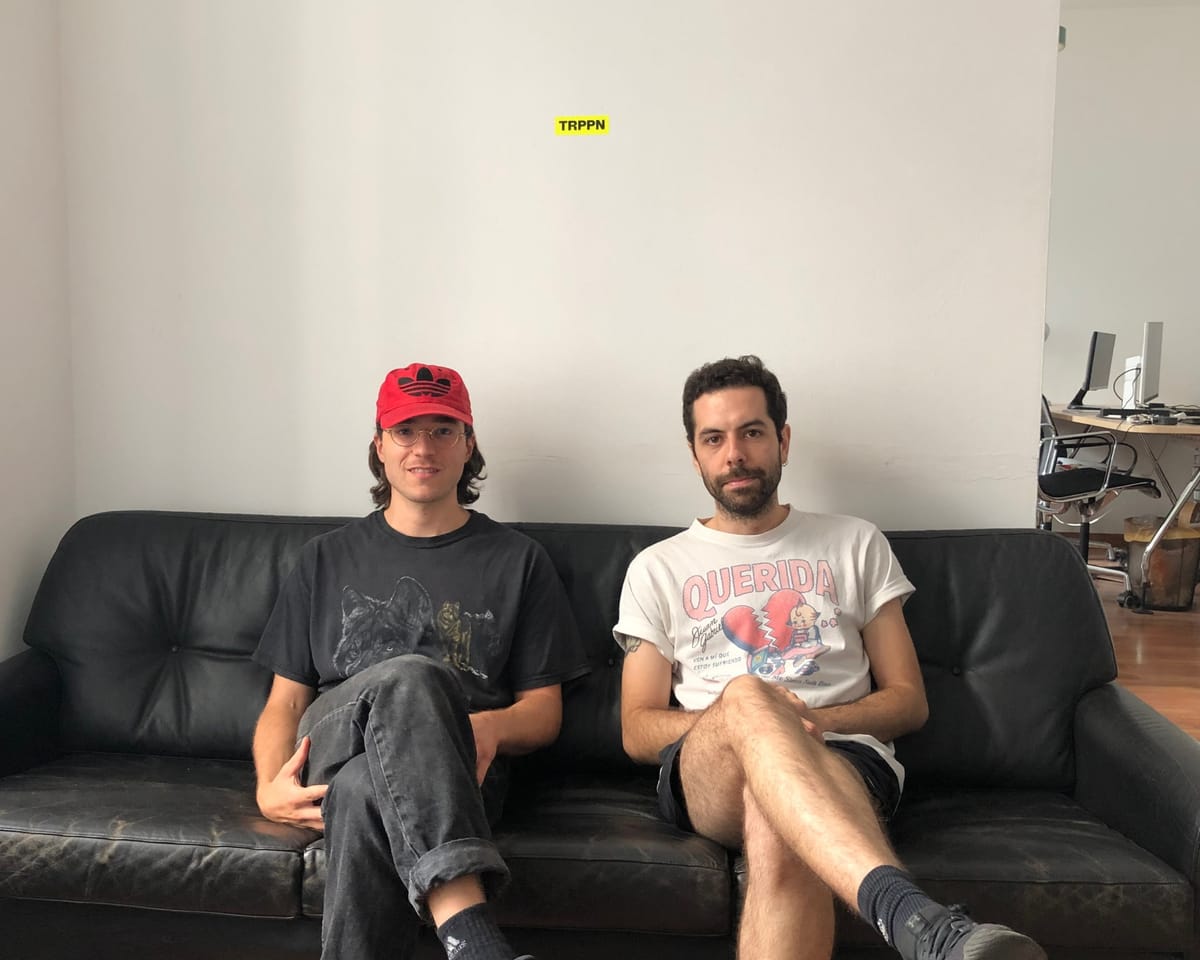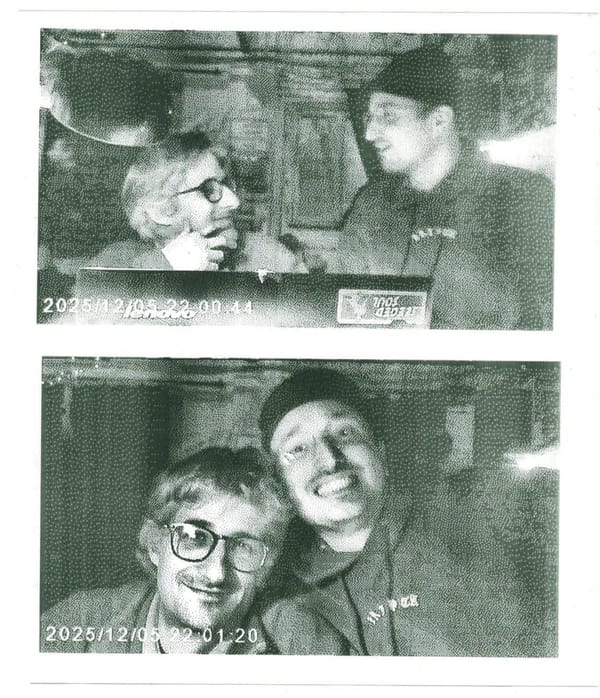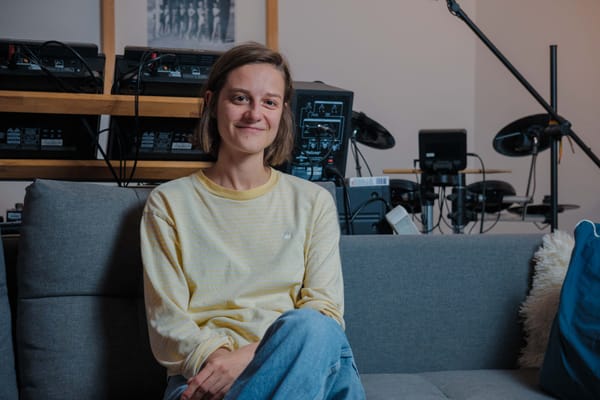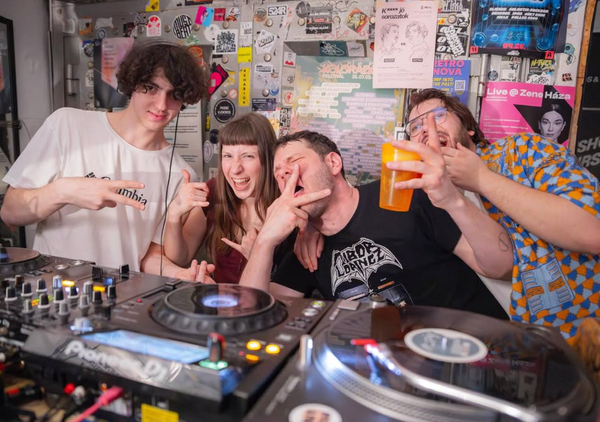Register for free to receive our newsletter, and upgrade if you want to support our work.
I’ve aimlessly tapped through my Instagram story feed recently when suddenly a bright, unignorable, yellowish-green neon color caught my attention. Very little information got a place over this shocking, monochrome background: the picture and name of a Viennese crew I follow, and the possible clue to what this is: #GoFindItOn TRPPN. Very few clicks later I found out that TRPPN (pronounced trippin’) is a platform and app used mostly in Vienna, and which instantly became my new favourite project. At first, I thought the platform is an answer to the downfall of Resident Advisor: you can register yourself as an artist, promoter, or club, and share your events. Later, I realised, it’s much more, with clever and useful functionalities. The map, for example, on which the events currently happening in your area pop up, with genre and location type filtering, alongside the classics of social media, like following and liking profiles. And, from their mission statement, the goal is even bigger: to create a new type of community, and even revenue for artists. I sat down with two representatives of TRPPN to discuss what the app is about, their opinions about the Viennese scene, and ask them about their plans – what they have plenty of.
MMN: Could you please introduce yourselves and explain your goals at TRPPN?
Reimundo: My name is Reimundo and I’m doing the content for TRPPN at the moment. When I came here I was responsible for building the brand and some kind of a marketing strategy. It was mostly about creating a tone and style for the company and our communication. Later on, I started doing the content, which means now I’m building a network of artists, trying to introduce as many as possible to TRPPN. I also shoot some videos and pictures, do interviews, promote events, etc. This is one of our goals, to have a network of artists and give them the tools to easily promote their events.
Michael: My name is Michael, I’m one of the founders of TRPPN. I’m currently responsible for the product, community building, the artist network, and the fundraising. We started this project about 2 years ago with 3 friends. The app itself launched a few months ago in Vienna, we call this the “beta-version” since this is where we’re testing the product before expanding to other countries. Our goal is to build a music social network for creators globally and to enable new income streams for creative people.
MMN: It says on your homepage that “Using blockchain technology TRPPN unlocks completely new ways for music creators to monetize music and events”. What does this mean?
M.: We started as a Web 2.0 project, but it became clear recently that if we want to build a community-owned network, we need to use blockchain technologies. TRPPN should become a community-driven platform, where everyone can participate, and everything’s democratized. The way we use blockchain is by utilizing TRPPN as a music detection service, meaning that DJs (and everyone) can track their sets or playlists at parties and gatherings. The creators activating the music detection will be paid in TRPPN Tokens, while the tracked setlist is also provided for the copyright holders so they can collect revenue. This is something completely new, by which we want to tackle the question of how much artists should make if their music is being listened to in bars, clubs, and parties. Streaming is clear – your track is being streamed for which you get some money, however little. But you get nothing for your tracks being played in clubs, parties, or just friendly gatherings. So this is how we became a Web 3.0 project…
R.: Soon Web 4.0. 😉
M.: Yeah, who knows? Some really interesting things are happening globally, both in technology and in the music scene.
MMN: There are some schemes set up for this though.
M.: There are, but they’re not really working. For one, there’s this big problem of transparency that always gets criticised in club culture. The clubs and venues are paying a monthly fee for the copyrights, but no one knows exactly which tracks were played, so they’re just giving the money to some already known artists in their networks. On the other hand, we want to address private settings as well, a house party for example.
R.: There’s one initiative that launched last year, a platform that tries to make DJs manually write down their sets after their gigs, and splits their revenue with the artists. So, let’s say I’m playing tonight for a hundred euros, and then I have to manually collect the tracks of my set AND transfer a part of my money to the artists. It seems like a fair idea, but it needs to be automated in some way. That’s what we’re trying to do, so you only have to activate the TRPPN bot on your phone, a kind of hearing device, and it works. Nobody has the time to write down setlists at the gigs, and then you forget what you played anyways.
M.: Exactly. The DJs activating the bot will also be paid in TRPPN Tokens, so they have an incentive to use it. And the blockchain makes sense for this kind of payout because you have these “smart contracts”, which can’t be manipulated. It’s necessary for the decentralization and democratization of the platform. It gives creators skin in the game like governance and participation in the success.
MMN: And what happens to the extremely obscure vinyl-only tracks that aren’t in any database?
M.: That’s a good question, but we’re trying to include those as well. We use a huge database (similar to the Shazam one), and it’s getting bigger and bigger. But we want to give the possibility for musicians to upload their tracks to our database as well so it gets recognised.
R.: If someone’s playing and we can’t recognise the entire set then you should pay them more. 😉
MMN: And how does the TRPPN Token relate to real-world money, what gives its value?
M.: That has to do with scarcity. There’s a limited amount of tokens, which means the more people use the platform, the more the token’s worth. And then you have these crypto-stocks where you can exchange your tokens for real, fiat money.
MMN: I want to discuss the networking part of the app a bit more. What do you feel is the need for this? How can it improve our traditional ways of networking based on face-to-face introductions?
M.: It’s always about the music. I think, this is the thing that connects us all. Therefore TRPPN should be the fastest and easiest way to get out there and meet like-minded people. We want to connect people with similar tastes in music digitally and in the real world as well. Both of us are well-connected in Vienna, but there’s so much more out there we don’t know about. TRPPN shows what’s happening near you in real-time, and shows the local scene as it is.
R.: Also, information is everywhere these days. For organising an event, you might need a Facebook page, Instagram, Resident Advisor maybe, you put up posters, write on blogs, and the list goes on. And these platforms are meant for everything, cooking, sports, etc. So this is an easy way to find the music geeks, to get into the music scene. The idea is that when you’re organising an event, you just have to go on TRPPN to find your audience, not 16 different platforms.
M.: That’s the point, it’s always about meeting somewhere and listening to music together. It’s not about the promotional stuff, nobody likes to do that anyways. With these tools, it’s much more effective and less effort.
MMN: We’ve discussed how the app is beneficial for artists and promoters. What about club owners, the audience, or other creators?
M.: We want to bring all of the different stakeholders together, not just DJs, but also VJs, MCs, dancers, performers, and bands.
R.: It’s not just about the people making music. There are a lot of elements to a great event. The people mentioned are an integral part of club culture, so we need to include them as well. And for the club owners, they have an extensive database of the audience, they can link the ticketing, it’s a direct channel to the market they’re in. They can basically advertise for free.
M.: Everything happening in the music scene should have a place on TRPPN. Record stores, sound engineers as well. Maybe even security at some point.
MMN: Alright, I’m in. How do I get on the app?
M.: Everyone can create these types of profiles, the artists we’ve mentioned, and you can create hosts, promoters, and booking agencies as well. You just go on the TRPPN Creator, a platform for contributors, which you can find on our website. Upload your information, and you’re ready to go. In the future, we plan on motivating these contributions with the TRPPN Token as well. If you bring your community on the platform, you create a lot of events, or you’re active in chats, you should get rewarded.
MMN: It’s not exactly about the app, I would like to talk a bit about club culture in Vienna. The city is not much bigger than Budapest, but I experience huge differences in our scenes. An app like TRPPN wouldn’t live long in Budapest since everyone already kinda knows each other. Isn’t it the same in Vienna? How often do you discover new stuff?
M.: As I’ve mentioned, we’re pretty well-connected in Vienna, but thanks to TRPPN I discover new stuff every week that I never would’ve found otherwise. There’s just so much happening, in electronic and live music as well, it’s impossible to hear about everything. Also, the booking agencies in Vienna have somewhat old-fashioned methods of promotion. They might organise hundreds of concerts per month, and I sometimes feel like they don’t even care if people come or not. And thanks to this you miss out on some really good stuff.
R.: We’re living in a new era of music as well. Not so long ago you still had to collect some records and have all the equipment to play, now you just plug in a pendrive and go. Especially after the pandemic, every third person is a DJ. There’s just an abundance of events, collectives are multiplying. There are less and less of big, repeating names, and there’s more versatility thanks to the younger generations. And they just keep coming and coming…
M.: Keep in mind, it’s still Vienna we’re talking about, not even London or Berlin. There’s an extensive club culture here as well, it’s just not that visible from the outside.
MMN: It’s nice to finally see life coming back to these cities after the pandemic.
R.: Yeah, it’s happening. It certainly does more so in some styles, younger generations are very into genres with a more ‘digital’ sound, like fast techno and hyperpop, so this happens on a massive scale. The classics, with more analogue sound, let’s say, are a bit more dependent on older crews doing their stuff.
MMN: Is there something that you feel is missing from the city these days?
R.: The sound of the ‘70s and ‘80s, definitely. But I do everything in my power to bring it back.
M.: Well, the Donaufestival happens every year in Krems, my hometown. It’s a very popular avantgarde-electronic music festival, which’s obviously very close to my heart. That’s a style I’d like to see more in Vienna. There are artists with this sound here too, but there are not many international bookings.
MMN: You’ve already mentioned some of your plans for the app, but I’d like to close with a quick summary of those. What’s coming in the near future?
M.: On the platform itself, the most recent improvement is that you can link ticketing to the events. A booking feature is in the works so that artists can get booked through the app. After that the plan is to implement the social feature, so you can connect with like-minded people, as a user and as a creator as well. You’ll be able to follow people, create groups, and chat with others. The tokenisation will happen in the next 6-8 months. The TRPPN bot will come after that, which will also enable users to see the last three tracks getting played, and listen into what’s happening in parties before going out.
R.: On the promotion and networking side, we want to grow and bring a more diverse community to the platform. We want to help them more with their promotions with our own tools, but also encourage them to share their ideas and bring more content to the platform. All our channels are open to help people and to receive critique from them too.
MMN: Bonus question: favourite RGB/HEX code?
R.: #d5ff00. That goes for the whole company.
Check out the TRPPN website and download the app here.







